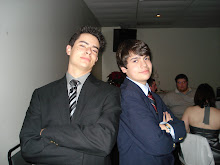Written in Ms. Smith's 3rd period. AP LANG!!!
The boldest memories of my elementary school years are of lying in bed with my window open on a breezy summer day, indulging myself in the epic wonder that was The Magic Tree House series. Through these books I was transported back to the farthest reaches of history, but not through the monotonous droning of my Dad’s World War II non fiction and even worse, the horridly simplistic and utterly boring text books at school. For me, a yearning for adventurous reading turned into a passionate love for the past and all of its secrets that it could offer me. Looking back, there was perhaps no series of books (and let me tell you I read tons of them) that had such a great effect on me as The Magic Tree House. The little history that I learned from the novels sparked my curiosity to find out more. By middle school I was tackling more advanced historical fiction that I found in the adult section at Davis-Kidd, and by high school my passion for history had grown into a passion for political history, and thus politics itself. I now wanted to make this my life long goal.
“Journalism!” it dawned on me. Suddenly my passion for reading other people’s words had suddenly become a fiery passion to create words of my own, and bring them to the world as those of the author’s I so viscously devoured had. The point I make here is that my love of the written and read word did not stem from some intense, life changing experience in a classroom straight out of Freedom Writers, or some other inspirational flick like that. It all started with one series and soon developed into a curiosity followed by a love and finally in a realized talent.
To me, an English class should not focus on structure and form and the “truths” that a novel puts forth. It seems that the current doctrine of the American English class is to herd the students in like retarded sheep, jamming books down their throat while screaming, “This is good literature! It’s good literature because a lot of people think its good literature. Oh and by the way, here’s what it says about life. Now read it and figure out how you can learn from it.”
No wonder the average American doesn’t even read one book in the course of an entire year as an adult. They are conditioned to remember ridiculous exercises of quote analysis, theme writing, and worst of all, the thematic essay which asked the student who didn’t like to read to read even more closely, and while their at it, to do something they dread even more. Write. English classes could learn quite a bit from the childhood stories of some of their students who like to read.
When I hit high school, I was ecstatic to finally be taking an intelligent English class that didn’t focus on correcting sentences and group reading simple short stories. But oh how I was fooled. The grammatical busy work suddenly was transformed into literary busy work. Instead of correcting sentences, I was picking them apart piece by piece, and trying to find the exact point that the instructor kept insisting the author meant to get across to me.
Whatever happened to reading for the sake of discovery? Why even seek to discover themes that an author intended in a novel if we are told them with some excruciatingly long fifty page “introduction to the novel” packet that tells you why the author wrote it, what was happening at the time they wrote it, and their ultimate purpose they were trying to get across. After reading all that (if the student even has any energy left to keep reading in the first place), why even open the book? If we already know everything about the themes of the book, then what else is there to learn about? We might as well get the context of the novel and the themes and then have a discussion about how we can better ourselves with those themes. English class has turned into morality class. Ultimately, an English teachers need to loosen the reigns a bit. Curiosity is the greatest facilitator of eventual knowledge, and the English classes of today only murder this curiosity before it ever has the chance to turn into a passion. Passion is what the subject of English requires. I do not believe that students are incapable of feeling passion about something other than Lauren’s recent boy toy on The Hills. Perhaps all that is needed is for the teachers to set their children free from the failed structure of their classes that only turns students away from their subject with a bored look on their face. If the chains of structure are loosened only slightly, we can all begin to find our own Magic Tree House.
Tuesday, February 26, 2008
Subscribe to:
Post Comments (Atom)

1 comment:
ERIC I want you to post everyday. I like reading your stuff so keep it coming!!!! So now that I have nothing better to do, I'm going to sleep
Post a Comment